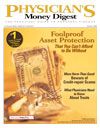Publication
Article
Physician's Money Digest
Do Your Advisors "Eat Their Own Cooking"?
Author(s):
You wouldn't want to dine at arestaurant where the chef disdainstheir own cuisine. Similarly,you should be wary of any financialadvisors or fund managers who don't"eat their own cooking." If a fund orinvestment program is good enough foryou, shouldn't it be good enough foryour advisor and the fund manager?
The own-cooking theory works ontwo levels. First, does your advisor personallyinvest in the mutual funds andinvestment programs recommended toyou? Second, are the mutual fundsadvocated managed by portfolio managerswho have put a hefty portion oftheir personal money into their ownfunds? If your advisor doesn't buy whatthey sell, it should raise a red flag.Perhaps there's an ulterior motive forrecommending a fund to you, like a salescontest. Some mutual fund families offerlavish junkets to exotic locations fortheir top salespeople. So, your advisormay be jockeying to win a trip to Mauiinstead of scouring the market for thebest possible funds for you.
Despite all the scandals about conflictsof interest, sales contests are stillperfectly legal. But the most reputablefund families do not run sales contests.They don't need to bribe representativesto push them. Their products' performancespeaks for itself. Beyond mutualfunds, if your advisor recommends aninvestment program to you—for example,a strategic asset-allocation program—they should be in it too.
Now let's look at the second issue.Are your mutual fund managers investingin their own portfolios? Many of thetop-performing fund families requirefund portfolio managers to literally puttheir money where their mouth is. Theyinsist that their portfolio managers putsome of their personal money in thefund. Whether it's required or not, it'sgood practice. Common sense says itstands to reason that managers willwatch the store more closely whenthey're owners too. And a recent studyconfirms it actually does.
Researchers at the Georgia Instituteof Technology and London BusinessSchool crunched the numbers for 1300mutual funds. They discovered thatfunds where managers owned at leastsome shares at the end of 2004 turned inan average return of 8.7% in 2005 vs6.2% by funds whose managers didn'tinvest in them. Furthermore, the researchersfound that with every 0.01%increase in manager ownership, fundperformance went up 0.03%.
It's not always easy to find outwhether your advisor and mutual fundmanagers are eating their own cooking.So ask a lot of questions, and don't stopasking until you're satisfied that you'vegotten a straight answer.
Frank Congemi is a financial advisor who works with many physicians in several states. He lives in Deerfield Beach, Fla, and has an office in Queens, NY. He welcomes questions or comments at 800-228-2309 or frank@frankcongemi.com.
